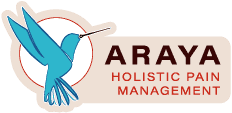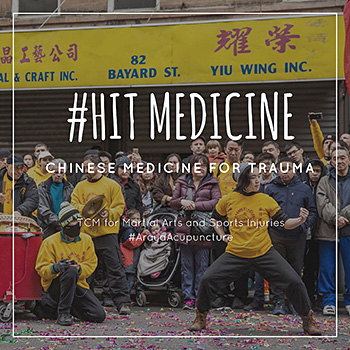TCM has a category of “Hit Medicine” that was specifically used for acute traumas, falls or any other injuries. Traditional Kung Fu schools would have their own secret herbal liniment called “die da jiu” translated to “hit-fall wine” that were used to treat strains and sprains. In my own Kung Fu training, I have used the die da jiu (dit dat jow) countless times that have sped up the healing time of all my injuries! (I’ve hurt myself way too much…but it is all for the sake of helping my future patients!) You could say I have had an acute interest that stems from my passion in the martial arts and Chinese medicine.
Chinese sports medicine is actually not in the core curriculum of most colleges of traditional Chinese medicine. I have been fortunate enough to have teachers and attend seminars that have taught me these skills. I have had my own injuries and have used basic Chinese Medicine principles to help heal myself during each stage of injury. I combined acupuncture, external herb therapy, internal herb therapy, moxibustion, self-massage/acupuncture and qi gong exercises. All of these tools combined allowed me to get back into the activities that I loved to do.
Shoulder Dislocations – Post Acute
This stage is a week or two after the initial injury that can last up to around three weeks. Sometimes there is still stiffness due to spasms in tendons that are still tight to protect the area that was injured. Treatment can be more aggressive at this point because the area is not as inflamed and swelling has decreased. Since the tendons will be overstretch, it is important at this stage to strengthen the tendons so it does not happen again!
Treatment Principles – Disperse any more stagnant blood, remove any other adhesions, strengthen sinews, while relaxing spasms.
Acupuncture – Go see your acupuncturist to get treatment to help remove any more stagnation in the shoulder!
Internal herbs: – Bone-Knitting powder (Create link?) 2x/day for about 2-3 weeks to help repair the tendons and soft tissue that were torn or overstretched
External herbs – Tendon Lotion (bought mine at Kamwo) to the shoulder several times a day to help bind the sinews that were overstretched. You can also use 701 plaster for any residual pain
Qi Gong – If there is any rotator cuff tear, doing rotator cuff exercises with a light weight; Qi Gong Sinew Changes are also excellent which I will put in a separate post.
Shoulder Dislocations/Pain – Chronic Stage
At this particular stage, the inflammation and swelling should be almost completely gone. This may be three to four weeks after the initial injury but depending on the severity of the injury, it may take up to six to eight weeks. Yuck right?..but especially for shoulder dislocations, it is imperative that it DOES NOT DISLOCATE IT AGAIN. Don’t be like me when I was younger and go back to boxing six weeks after the injury…boy that was a mistake. The sinews (tendons) in this case became overstretched and they are prone for re-injury within a six month period.
If there is still pain and discomfort, there is most likely still instability in the joint and some residual blood stasis and qi accumulation. There can also be cold that penetrated into the injured tissue where the area may be more sensitive and achy during the cold weather.
External herbs – If the area is aggravated by cold, tendon lotion is still really great or U-I oil is another favorite of mine to help warm up the area.
Moxibustion – This handy herb is “mugwort” that I did during the acute stage but can be very useful if the injury becomes chronic
Acupuncture – Ear points: Shoulder, shen men, sympathetic, liver
Qi Gong exercises – Sinew strengthening exercises
Let me know any other injuries that you may have questions about regarding how TCM can help you!






